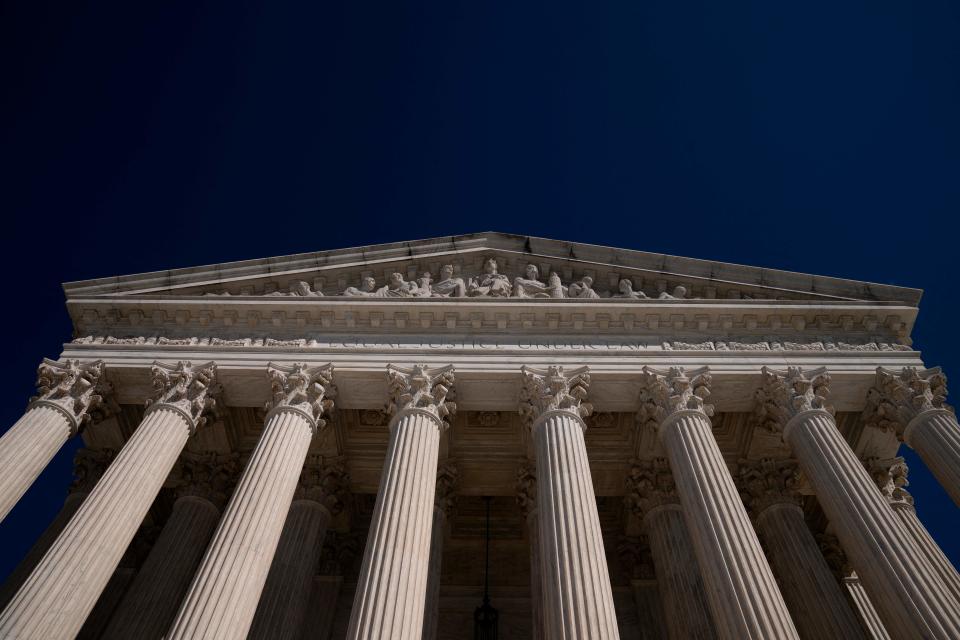'Racist taint.' Will the Supreme Court review a Jim Crow-era voting ban targeted at Black Mississippians?
WASHINGTON – The Mississippians who gathered to revise their state constitution in 1890 with new voting restrictions couldn't have been clearer about their intent: "We came here to exclude the Negro," a leading member of the group said at the time.
More than 130 years later, the Supreme Court is weighing whether to hear an appeal that challenges a key element of that effort – a permanent voting ban on people convicted of certain felonies – that remains part of Mississippi's constitution today.
Eleven states, including Mississippi, don't automatically restore voting rights after convicted felons serve their prison sentences, according to the National Conference of State Legislatures. But voting rights experts say that even among those states, Mississippi is an outlier because of how difficult it is for people to regain the right to vote.
Roughly 1 in 7 Black voting-age Mississippians is disenfranchised, according to the Campaign Legal Center, a watchdog group.
"If the court were to take on this case – and hopefully, as we are arguing, rule against Mississippi – it really would convey a point that the right to vote is the essence of our democratic society," said Patricia Okonta, an assistant counsel at the Legal Defense Fund. "Any restrictions on that right strike at the heart of a representative government and should be outlawed."
What's at stake in the Supreme Court case on Mississippi's voting ban?
At Mississippi's 1890 constitutional convention, delegates eliminated the right to vote for people convicted of felonies thought to be "Black crimes," a perception based largely on which crimes were prosecuted. So while burglary, theft, arson and forgery were included as crimes that could wipe out a person's right to vote, murder and rape were not added to the list until 78 years later in 1968.
Two Black residents of Mississippi, one convicted of forgery and the other of embezzlement – both unable to vote because of the provision – sued in 2017 asserting that the provision violated the equal protection clause. The U.S. Court of Appeals for the 5th Circuit sided with the state, ruling that the plaintiffs failed to demonstrate the provisions were motivated by discriminatory intent and holding that any "racist taint" had been "cured" by amendments to the provision.
The Supreme Court has rescheduled the appeal for consideration five times since February. The court will eventually decide whether to grant or deny review.

'Government under the control of the white people'
Twenty-five years after the end of the Civil War, as African Americans began to gain political power throughout the nation, Mississippi enacted voting prohibitions intended to suppress that movement.
The state's senior senator, James George, said that the convention's "first duty" would be to change the state's constitution to ensure "a home government, under the control of the white people of the state," court records show. One county delegate declared that the state's government should be "for all time in the control of the white race."
The constitution that emerged barred people convicted of "bribery, burglary, theft, arson, obtaining money or goods under false pretenses, perjury, forgery, embezzlement or bigamy," from voting. There is little disagreement that the drafters selected crimes that they thought would suppress the Black vote.
What's at issue in Harness v. Watson is whether the "taint" of a Jim Crow-era law can be "cured" by later amendments. In 1950, the state amended the constitution to remove burglary from the list of crimes. In 1968 the state amended the provision again to include murder and rape. The rest of the prohibition remains as it was in 1890.
Because there is no evidence of discriminatory intent when the state revised the constitution in 1968, Mississippi has argued, the provision is in the clear.
"The state's 1950 and 1968 enactments purged any taint from the 1890 law," Mississippi told the Supreme Court. In both cases, the state said, "voters approved in its entirety the new list of crimes by majority vote and without improper purpose."

What's the big picture?
In a series of recent decisions, the Supreme Court has slowly reduced the scope of the Voting Rights Act of 1965 – a landmark law signed by President Lyndon Johnson that was intended to ensure African Americans have equal access to voting. In 2021, a divided court upheld absentee ballot restrictions in Arizona in a decision that is expected to make it harder to win other voting discrimination suits.
Last fall, several of the court's conservatives expressed skepticism about a challenge to Alabama's congressional map, which includes 1 district out of 7 with a majority of Black voters even though African Americans make up 27% of the state's population. A decision in that case, Merrill v. Milligan, is expected by June.
In the Mississippi appeal, both sides rely heavily on a Supreme Court precedent from 1985. A unanimous court invalidated a provision of Alabama's constitution approved in 1901 that permitted disenfranchisement for crimes "involving moral turpitude." The Mississippi plaintiffs say their constitution is similarly discriminatory but the state counters that, unlike Mississippi, Alabama had never amended the provision.
This article originally appeared on USA TODAY: Supreme Court asked to toss Jim Crow voting ban aimed at Black felons

 Yahoo Movies
Yahoo Movies 
